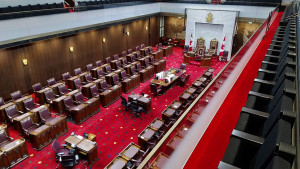The federal government is methodically creating new rules that will guide stakeholders as they build Canada’s new decarbonized energy infrastructure.
Two days apart, Aug. 8 and 10, federal ministers released a document titled Powering Canada Forward that promised that a Clean Energy Strategy would be released in 2024, and then announced new Clean Electricity Regulations that offered indications of how the conversion policy would be enforced, including hefty fines against energy offenders.
Electricity Canada president and CEO Francis Bradley, representing energy generators and distributors, said the two policy announcements don’t do anything “with respect to making it easier to build things.”
“It’s one piece,” he said, referring to the regulations. “It doesn’t do anything at all to help build things any more rapidly. It doesn’t help us build now.”
But, Bradley said, “It is an important piece of the instruments that the government needs. So, funding instruments, regulatory instruments and permitting tools, and so on.”
The Aug. 8 announcement from Minister of Energy and Natural Resources Jonathan Wilkinson said the project to transform Canada’s electricity sector and decarbonize grids by 2035 “rivals any nation-building project in Canada’s history.”
Two days later, Wilkinson and Minister of Environment and Climate Change Steven Guilbeault announced they were setting new rules to phase out carbon emitters and stimulate investments in renewable energy such as wind and solar, smart grid and energy storage systems, and emerging technologies such as small modular reactors and carbon capture and storage.
The government said it will cost $400 billion nationally through 2050 to replace aging facilities and expand generation capacity to meet the expected doubling in demand. The Liberal government has announced $40 billion in tax credits and other spending to spur construction of new power sources and retrofit existing plants.
Bradley suggested the $400-billion price tag was lower than other sources have suggested.
“It’s not a number that I’d seen previously. It’s a smaller number,” he said. “If we can do what needs to be done for $400 billion, I think that’ll be great news, but I’ve seen previous research by the Conference Board of Canada that estimates the cost in the vicinity of $1.7 trillion.”
Under the proposed regulations, which are circulating for public comment over 75 days, corporate fines for non-compliance in 2035 could be as high at $12 million and corporate officers could face fines up to $2 million with three years in jail. There are also provisions permitting non-compliant energy sources to be used in certain circumstances and exempting recently built non-compliant plants, allowing them to operate for 20 years after they have opened.
Bradley said the announcements of tax incentives in the spring federal budget were the “carrot” and the proposed regulations the “stick.”
The provinces that are feeling the biggest pressure to transform are Alberta, which has a grid powered 85 per cent by oil, gas and coal, Nova Scotia, 79 per cent, and Saskatchewan, 78 per cent. Both Alberta Premier Danielle Smith and Saskatchewan Premier Scott Moe issued statements calling the proposed federal regulations unconstitutional.
“Trudeau’s net-zero electricity regulations are unaffordable, unrealistic and unconstitutional,” tweeted Moe.
Smith outlined her province’s plan to eventually decarbonize its power grid and said, “These regulations make desperately needed investments in new natural gas generation almost impossible. If implemented in Alberta, these regulations would endanger the reliability of Alberta’s power grid and cause massive increases in Albertans’ power bills.”
The provinces and the federal government will be consulting on next steps later this year.
Bradley commented, “We heard yesterday that (provinces) are not disputing the destination. We’re all in agreement that we’re heading to a decarbonized electricity system.
“What we do not have consensus on is the timeline during which that’s going to take place and the actual mechanisms that will be used.”
A white paper released by Electricity Canada in the spring called for a more streamlined permitting process. The federal budget announced it would be addressing that issue but Bradley said his association is still waiting.
“This announcement yesterday doesn’t have anything to do with that, this is just the regulatory regime that they’re going to be putting in place for all this,” he said.
“And we keep coming back, our fundamental concern, and that is it’s barely 4,000 days away until net-zero 2035. And we need to get building.”
Follow the author on Twitter @DonWall_DCN.










It is very unfortunate that the federal Liberal government is unable to appreciate, understand, and provide logical, rational responses to provincial concerns…I do not see this happening at all, and the only solution is to change government, in anticipation that a new leadership in 2025…or earlier…will take a more rational approach, one which recognizes unique provincial energy requirements!
recognize